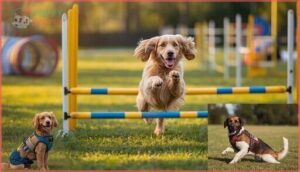This site is supported by our readers. We may earn a commission, at no cost to you, if you purchase through links.

The key is understanding their to-please nature while addressing breed-specific challenges like separation anxiety and occasional stubbornness. With the right approach, your Cocker will likely surprise you with how quickly they pick up everything from basic obedience to impressive tricks, though success depends heavily on timing, technique, and patience.
Table Of Contents
- Key Takeaways
- Cocker Spaniel Breed Overview
- Temperament and Personality Traits
- Are Cocker Spaniels Hard to Train?
- Key Behavioral Issues in Cocker Spaniels
- Essential Training Tips for Owners
- Training Cocker Spaniel Puppies
- Advanced Training and Activities
- Grooming and Health Care Essentials
- Annual Cost of Owning a Cocker Spaniel
- Top 5 Products for Cocker Spaniel Care
- Frequently Asked Questions (FAQs)
- Why are cocker spaniels so hard to train?
- At what age do cocker spaniels calm down?
- What are the behavioral issues with cocker spaniels?
- Are cocker spaniels high maintenance dogs?
- How often should I groom my Cocker Spaniel?
- Are Cocker Spaniels suitable for families with young children?
- What is the recommended diet for a Cocker Spaniel?
- What age should cocker spaniels start training?
- How long are typical cocker spaniel training sessions?
- Do cocker spaniels need professional trainers?
- Conclusion
Key Takeaways
- Cocker Spaniels rank in the top 25% for intelligence, typically learning new commands in just 5-15 repetitions, making them easier to train than many breeds when you use consistent positive reinforcement methods.
- The breed’s sensitive nature requires gentle training approaches—harsh corrections backfire, but their eager-to-please temperament responds beautifully to reward-based techniques and patient consistency.
- Early socialization between 3-14 weeks prevents common behavioral issues like separation anxiety, resource guarding, and the rare but serious “rage syndrome” that affects some solid-colored Cocker Spaniels.
- Success depends on understanding breed-specific challenges, including their emotional intelligence, potential stubbornness, and need for mental stimulation—short 5-10 minute training sessions work best for their attention span.
Cocker Spaniel Breed Overview
Cocker Spaniels are gentle, intelligent sporting dogs originally bred as hunting companions who now excel as loving family pets.
These medium-sized dogs come in two main varieties—American and English—each with their own distinct characteristics and slightly different temperaments.
History and Origin
Picture this: a breed born from the mist-covered moors of Spain, where these determined little hunters first earned their stripes chasing woodcock through dense underbrush centuries ago.
Cocker spaniels have quite the story to tell. Their sporting roots go back to 14th-century Spain, where they worked as skilled bird dogs. Early breeders carefully refined their hunting abilities through selective breeding over generations.
When the breed made its way to America, it eventually split into two distinct varieties—the English and American Cocker Spaniels. Both types still carry that hunting heritage in their DNA today.
Appearance and Size
With their compact, sturdy build and those unmistakable silky ears that seem to dance with every step, Cocker Spaniels are like walking teddy bears that weigh between 20-35 pounds.
Their flat or slightly wavy coat comes in stunning colors from golden to chocolate, featuring distinctive feathering details on the legs and chest that require regular grooming upkeep to prevent matting.
American Vs. English Varieties
Think of these two varieties as cousins who went to different schools – they share the same sweet personality but developed their own unique looks along the way.
American Cocker Spaniels are smaller and more compact, while English Cocker Spaniels stand taller with longer legs.
Both varieties respond well to positive training methods, though English Cockers often show slightly higher energy levels during exercise sessions.
These two breeds are basically siblings who took different paths – same lovable nature, just different builds.
Temperament and Personality Traits
Cocker Spaniels shine as family companions thanks to their gentle, affectionate nature and considerable emotional intelligence.
These dogs form deep bonds with their owners and excel at reading human emotions, making them naturally suited for families with children and other pets.
Affection and Family Suitability
If you’ve ever wondered whether Cocker Spaniels make good family pets, here’s your answer: these dogs don’t just love their families—they practically worship them. Their loyalty levels run incredibly deep, making them wonderful child companions and providing wonderful senior companionship.
Here’s what makes Cocker Spaniels remarkable family pets:
- Child friendliness – They’re gentle and patient with kids
- Adaptability – They adjust to your family’s routine easily
So what makes these dogs such amazing family companions?
- Canine friendliness – They get along well with other dogs
Emotional Intelligence
Your Cocker Spaniel doesn’t just understand commands—they read your emotions like an open book, picking up on subtle changes in your tone, body language, and even your stress levels.
This considerable empathy development makes them naturally attuned to social cues, strengthening their bonding capacity with you.
Their anxiety detection abilities mean they’ll often comfort you before you realize you need it, showcasing why Cocker Spaniels’ intelligent nature extends far beyond basic dog trainability.
Interaction With Children and Other Pets
Many families wonder if these gentle sporting dogs mesh well with busy households full of kids and multiple pets.
Cocker Spaniels shine as family dogs thanks to their natural child friendliness and adaptable play styles. Their high sociability makes them excellent family pets in multi-pet homes, though you’ll need proper supervision during introductions and when establishing routines with new pets.
Are Cocker Spaniels Hard to Train?
Cocker Spaniels aren’t hard to train—they rank in the top 25% of dog breeds for intelligence and usually learn new commands in just 5-15 repetitions.
However, you’ll need to address breed-specific challenges like potential aggression issues and their sensitive nature that responds best to gentle, positive training methods.
Intelligence and Trainability Rankings
Looking at standardized intelligence tests, Cocker Spaniels rank impressively high among dog breeds. English Cocker Spaniels hold 18th place globally, while American varieties rank 20th-23rd out of over 200 breeds tested.
These rankings reflect their considerable learning speed—they master new commands in just 5-15 repetitions and obey first commands about 85% of the time, placing them in the “excellent working dogs” category. Their high intelligence means they respond well to positive reinforcement techniques.
Common Training Challenges
While Cocker Spaniels rank impressively in intelligence tests, they’re not immune to a handful of stubborn quirks that can test even the most patient owner’s resolve. Their attention spans can waver when distractions arise, and breed stubbornness sometimes overrides their eagerness to please.
Motivation issues surface if training becomes repetitive, while inconsistent commands from different family members confuse these sensitive dogs. Handler experience matters greatly in Cocker Spaniel training success.
Differences by Age and Variety
Training a puppy versus an adult Cocker Spaniel is like teaching a child versus a teenager—different ages bring unique challenges and advantages. Your Cocker Spaniel puppy absorbs commands quickly but struggles with attention span. Adult trainability peaks around 2-3 years when they balance intelligence with focus.
Consider these age-specific factors:
- Puppy temperament: High energy but short 5-minute attention spans require brief, frequent sessions
- Senior care needs: Older dogs may develop hearing issues affecting English Cocker Spaniel responsiveness
- Breed differences: American Cocker Spaniel varieties often show more sensitivity than their English cousins during training
Key Behavioral Issues in Cocker Spaniels
While Cocker Spaniels are generally sweet-natured dogs, they can develop several behavioral challenges that require your attention and proper management.
Understanding these issues early helps you address them before they become serious problems that affect your family’s daily life.
Aggression and “Rage Syndrome”
The most concerning behavioral issue in this breed involves sudden, explosive aggression known as “Rage Syndrome.” This genetic predisposition affects solid-colored Cocker Spaniels more frequently, with golden dogs showing aggression rates up to 12%. Early detection around 7-11 months helps guide treatment options including medication and behavior modification. This condition is also known as idiopathic aggression, characterized by sudden, intense aggressive outbursts.
| Risk Factor | Details |
|---|---|
| Color Correlation | Golden and solid colors show highest rates (12% vs 3.66% bi-colored) |
| Age of Onset | Episodes generally begin 7.5-11 months old |
| Genetic Predisposition | Males affected more (4.95%) than females (2.87%) |
| Treatment Options | Anticonvulsants and behavior therapy show 50% improvement |
| Warning Signs | Sudden freezing, intense staring before explosive episodes |
Separation Anxiety
Since Cocker Spaniels form deep emotional bonds, they’re particularly vulnerable to separation anxiety. Studies show this affects 14-20% of dogs, with Cocker Spaniels showing higher anxiety prevalence rates.
Key behavioral symptoms include:
- Persistent barking and vocalization (70% of affected dogs)
- Destructive behaviors like scratching doors and chewing (60% of cases)
- Indoor accidents despite proper house training (45% occurrence)
- Escape attempts that can cause self-injury (30-40% of dogs)
Environmental triggers often include schedule changes, moving homes, or traumatic experiences.
Treatment options combining behavioral modification with medication show 70% success rates, addressing both separation anxiety and comorbid conditions effectively.
Resource Guarding and Barking
Picture your sweet Cocker Spaniel suddenly turning into a four-legged fortress when you reach for their food bowl – that’s resource guarding in action. This food aggression and toy possession behavior affects about 70% of Cocker Spaniels around seven months old.
Territorial barking often accompanies these anxiety triggers, creating management challenges that require consistent dog training and understanding of Cocker Spaniel temperament.
Essential Training Tips for Owners
Success with cocker spaniels comes down to three key principles that work like magic when applied consistently.
You’ll discover that positive reinforcement, clear communication, and early socialization transform even the most stubborn spaniel into a well-behaved companion.
Positive Reinforcement Techniques
Think of positive reinforcement as your secret weapon in the training toolbox—it’s like speaking your Cocker Spaniel’s love language fluently. Reward timing matters most—praise within three seconds of good behavior so your dog connects the dots.
Use high-value treats for motivation during Cocker Spaniel training sessions. Clicker training works beautifully for shaping behavior, especially with this breed’s emotional intelligence.
Skip punishment entirely—it backfires with sensitive Cocker Spaniels.
Consistency and Clear Communication
You wouldn’t tell your dog “sit” one day and “please be seated” the next—yet many owners sabotage their training by sending mixed signals. Your Cocker Spaniel craves predictability. Use the same command words every time, and make certain family members follow identical Training Consistency rules.
Key elements for Clear Commands:
- Use one-word cues like “sit,” “stay,” “come”
- Maintain the same tone and body language
When giving your Cocker Spaniel commands, stick to these essentials:
Family Involvement prevents Avoiding Confusion in your Cocker Spaniel behavior and training journey.
Early Socialization Strategies
Most dog owners miss the golden window when their Cocker Spaniel’s brain is like a sponge, soaking up every new experience between 3 and 14 weeks old. During these Fear Periods, you’ll want to create Safe Environments where your pup meets different people, sounds, and textures through Handling Exercises and Puppy Classes.
| Age Range | Key Focus | Activities |
|---|---|---|
| 3-7 weeks | Basic handling | Gentle touch, varied surfaces |
| 8-12 weeks | Social exposure | Puppy classes, new people |
| 13-16 weeks | Environment variety | Car rides, different locations |
| 17-20 weeks | Confidence building | Group activities, challenges |
Your Socialization Checklist should include controlled meetings with vaccinated dogs to establish proper Dog socialization patterns that prevent aggression issues later.
Training Cocker Spaniel Puppies
Training your Cocker Spaniel puppy requires patience and consistency, but these intelligent dogs usually master new commands within 5-15 repetitions.
Starting with the basics like crate training, house training, and leash manners will set the foundation for a well-behaved adult dog.
Crate and House Training
Establishing a solid foundation with crate and house training transforms your Cocker Spaniel puppy from a whirlwind of accidents into a confident, house-trained companion.
Start with proper crate introduction—make it cozy with blankets and treats. Choose the right crate size where your pup can stand and turn around comfortably.
Set a consistent potty schedule every two hours initially. Clean accidents thoroughly with enzymatic cleaners to prevent repeat incidents.
Leash Training Basics
Leash training transforms your enthusiastic Cocker Spaniel from a determined tugboat into a walking companion who actually walks beside you instead of dragging you down the street like a water-skier.
Start with proper equipment choices—a standard collar and six-foot leash work best for leash introduction. Practice walking etiquette indoors first, rewarding your pup when they stay beside you.
For pulling solutions, stop moving when they tug and only continue when the leash relaxes. This teaches them that pulling gets them nowhere fast.
Obedience Foundations
Building a solid foundation in basic obedience isn’t just about teaching commands—it’s about creating a language you and your Cocker Spaniel both understand. Start with essential basic commands like “sit,” “stay,” and “come” using positive reinforcement.
Focus on recall training early, as Cocker Spaniel temperament and training respond well to consistency.
Practice bite inhibition and leash manners during socialization start periods when your puppy’s trainability peaks.
Advanced Training and Activities
Once your Cocker Spaniel masters basic commands, you can explore exciting higher-level activities that showcase their natural talents.
These intelligent dogs excel in agility courses, therapy work, and even their original hunting roles when given proper training and patience.
Agility and Trick Training
Once your cocker spaniel masters basic commands, their athletic build and eager-to-please nature make them natural stars in agility courses and trick competitions. Start with simple obstacles like low jumps and tunnels.
Their trainability shines when you use positive reinforcement and training toys as rewards. Build course design complexity gradually—these dogs excel at weaving poles and contact obstacles.
With consistent cocker spaniel training tips focused on agility benefits, you’ll develop their natural dog behavior into impressive skills ready for competition prep.
Fieldwork and Hunting Skills
Beneath that gentle, feathered exterior beats the heart of a natural-born hunter—and your Cocker Spaniel’s ancestors spent centuries perfecting these instincts in the field. These hunting dogs excel at gun dog training when you tap into their natural bird dog skills and trainability through consistent dog training focused on dog behavior.
- Retrieving Drills: Start with basic fetch, then progress to water retrieves and blind retrieves where your dog can’t see the fallen bird
- Flushing Techniques: Teach your spaniel to work within gun range, using scent tracking to locate and flush birds on command
- Scent Tracking: Build their natural nose work through trail following exercises and hidden bird training dummies
Therapy and Service Roles
Beyond their gentle temperament, Cocker Spaniels show exceptional therapy suitability due to their emotional intelligence and adaptability.
Training costs for certified therapy work range from $10,000–$40,000, with specialized functions including PTSD assistance and medical alert roles. Their scent detection abilities enable diabetic and seizure alert service work, though program resources limit placements to 20–25% success rates for specialized functions.
Client outcomes are impressive—80% report reduced stress levels after sessions.
Grooming and Health Care Essentials
Proper grooming isn’t just about looks—it’s your first line of defense against common health issues that plague this breed.
Your cocker spaniel’s high-maintenance coat and sensitive ears need daily attention to prevent painful infections and costly vet bills down the road.
Coat Maintenance and Brushing
Think of your Cocker Spaniel’s coat like a beautiful silk dress that needs daily attention—skip the brushing, and you’ll face a tangled mess that’s twice as hard to fix. Daily brushing prevents mats from forming in those feathery areas around the legs and ears.
Your cocker spaniel’s coat texture demands the right grooming tools to manage shedding frequency effectively. Professional grooming every 6-8 weeks keeps your dog looking sharp and healthy.
Nail, Ear, and Dental Care
Your spaniel’s nails, ears, and teeth need just as much attention as that gorgeous coat—skip these basics and you’ll be dealing with painful infections and expensive vet bills. Think of these grooming tasks as your dog’s health insurance policy.
Here’s your maintenance routine:
- Nail trimming frequency: Every 2-3 weeks to prevent painful overgrowth and splitting
- Ear cleaning solutions: Use veterinarian-approved cleaners weekly to prevent infections in those long, floppy dog ears
- Dental chew types: Daily dental chews or brushing prevents tartar buildup and gum disease
- Professional grooming costs: Budget $50-80 every 6-8 weeks for complete nail trimming, ear cleaning, and oral care services
Common Health Problems
Three major Cocker Spaniel health problems require your attention as an owner. Ear infections plague American Cockers at 27% prevalence rates, while vision problems affect the breed considerably more than others. Understanding these common health issues helps you provide better preventive care.
| Health Category | Specific Condition | Risk Level |
|---|
If you own a Cocker Spaniel, you’ll want to watch out for three health issues that commonly affect this breed.
Ear infections hit American Cockers hard—about 27% deal with them—and eye problems show up more often than in most other dogs.
| Vision Problems | Progressive retinal atrophy | Moderate to severe |
| Skin Allergies | Pyoderma from matting | Moderate with poor grooming |
Hip dysplasia screening remains essential, though Cockers show medium risk compared to larger breeds. Lifespan factors include heart disease (75% of age-related deaths) and tumors as leading mortality causes. Regular vet checkups catch these dog health problems early.
Annual Cost of Owning a Cocker Spaniel
Owning a Cocker Spaniel comes with annual expenses ranging from $2,850 to $5,200. Your biggest costs will include food, vet care, grooming, and supplies needed to keep your dog healthy and happy.
Food and Nutrition Expenses
Feeding a Cocker Spaniel well doesn’t have to break the bank, but quality nutrition is one investment that pays dividends in your dog’s health and energy.
You’ll spend roughly $600-900 annually on premium dog food, depending on your Cocker Spaniel’s size and dietary requirements. Factor in treats for training ($100-150 yearly) and occasional supplements if your vet recommends them for joint or coat health.
Vet Care and Insurance
Veterinary expenses represent the largest variable cost in Cocker Spaniel ownership. Annual vet bills commonly range from $400 to $700, but breed-specific conditions can push lifetime healthcare costs between $14,000 and $20,000. Here’s what drives these expenses:
- Periodontal disease affects 21% of Cocker Spaniels annually
- Ear infections occur in 10% of the breed yearly
Your vet bills will likely be your biggest ongoing expense with a Cocker Spaniel. Routine care costs about $400 to $700 each year, but these dogs can rack up $14,000 to $20,000 in healthcare costs over their lifetime thanks to breed-specific issues.
- Obesity impacts nearly 10% requiring management
- Preventative care includes regular health screenings
Pet insurance averages $42 monthly for Cocker Spaniels. Policy coverage types include lifetime, highest benefit, and time-limited plans. Insurance claim frequency is highest for dental issues, ear problems, and hereditary eye disorders—making coverage essential for managing breed health challenges.
Grooming and Supplies
Professional grooming costs can quickly drain your wallet, with Cocker Spaniel owners spending $600-$1,200 annually on brushes, shampoos, and specialized tools to maintain that signature silky coat.
Their coat type requires daily brushing and professional groomers every 6-8 weeks for shedding control.
Dog grooming supplies need proper supply storage to last longer and protect your investment.
Top 5 Products for Cocker Spaniel Care
Proper grooming tools and health products make caring for your Cocker Spaniel much easier and more effective.
These five essential items address the breed’s specific needs, from their high-maintenance coat to their prone-to-infection ears.
1. Hertzko Self Cleaning Pet Brush

Most groomers swear by this brush for good reason. The Hertzko Self Cleaning Pet Brush addresses Cocker Spaniel grooming with impressive grooming efficiency, removing up to 90% of loose hair in one session.
Its stainless steel bristles offer excellent bristle durability, lasting over two years with regular use. The self-cleaning feature sets it apart—just press a button to retract bristles and remove collected fur in seconds.
Perfect breed suitability for both American and English varieties, with rounded tips that won’t irritate sensitive skin during your dog grooming routine.
Best For: Pet owners with Cocker Spaniels or other medium to long-haired dogs who want efficient shedding control and easy cleanup.
- Self-cleaning button removes collected fur in seconds, making cleanup effortless
- Rounded bristle tips prevent skin irritation, making it safe for sensitive dogs
Cons:
- May be too aggressive for pets with very thin coats or extremely sensitive skin
- Some users report the standard bristles feel scratchy compared to softer alternatives
- Less effective on very short-haired breeds or dogs with human-like coat textures
2. OUAI Dog Shampoo Mercer Street Scent

Transform your Cocker Spaniel’s grooming routine with OUAI Dog Shampoo Mercer Street Scent. This premium formula combines ingredient safety with superior cleansing efficacy, featuring aloe vera and rambutan seed extract for gentle coat care.
The luxurious scent profile includes Italian lemon, Turkish rose, and white musk, keeping your dog fresh for up to seven days. At $32, this ethical attributes champion is paraben-free, sulfate-free, and cruelty-free.
Consumer reception consistently rates it 4-5 stars, making it ideal for regular Cocker Spaniel grooming and appearance maintenance.
Best For: Dog owners with Cocker Spaniels or other breeds who want a premium, gentle shampoo that provides long-lasting fragrance and superior coat care without harsh chemicals.
- Contains nourishing ingredients like aloe vera and rambutan seed extract that hydrate and strengthen your dog’s coat while being safe for sensitive skin
- Clean formula that’s paraben-free, sulfate-free, phthalate-free, and cruelty-free with excellent consumer ratings (85% give it 4-5 stars)
Cons:
- Premium price point at $32 makes it significantly more expensive than most standard dog shampoos on the market
- Synthetic fragrance may cause skin sensitivity reactions in dogs with specific allergies or very sensitive skin
- Requires thorough rinsing to prevent potential skin irritation, and one bottle may not last as long for frequent bathers
3. Coastal Pet Dog Nail Trimmer

Why struggle with basic nail clippers when your Cocker Spaniel’s grooming deserves better? The Coastal Pet Dog Nail Trimmer delivers professional blade sharpness through stainless steel construction, guaranteeing clean cuts every time.
Its ergonomic design features non-slip grips and large finger holes that prevent hand fatigue during sessions. Safety features include a protective stop mechanism that reduces injury risk—important for Cocker Spaniel training and behavior success.
With trimming frequency recommendations of every 7-10 days initially, then monthly maintenance, this tool promotes proper cocker spaniel grooming and appearance. Cost analysis shows excellent value at $11.99-$19.99 for essential dog training foundation through stress-free dogs nails care.
Best For: Dog owners with small to medium breeds like Cocker Spaniels who want professional-quality nail trimming with built-in safety features.
- Sharp stainless steel blades deliver clean, precise cuts without nail splitting or splintering
- Excellent value at $11.99-$19.99 with durable construction for long-term use
Cons:
- May not handle very large dogs over 20kg due to size limitations
- Some users find the safety guard obstructive during trimming sessions
- Can develop rust over time, especially in humid storage conditions
4. Zymox Enzymatic Ear Cleanser for Pets

For Cocker spaniels prone to ear infections, this gentle enzyme ear care solution offers safe ingredients that won’t irritate sensitive ears. The LP3 Enzyme System provides natural antimicrobial action for routine cleaning without harsh detergents.
Use 1-2 times weekly to prevent wax buildup and maintain healthy ears. Perfect for infection prevention in breeds with long, floppy ears that trap moisture and debris.
This veterinarian-recommended cleanser helps keep your Cocker spaniel’s ears clean between professional grooming sessions.
Best For: Cocker Spaniels and other floppy-eared breeds that need regular ear maintenance to prevent infections and wax buildup.
- Gentle LP3 enzyme formula won’t irritate sensitive ears like harsh chemical cleaners
- Made in USA with non-toxic ingredients safe for regular use on all ages
Cons:
- Only for maintenance cleaning – won’t treat active infections or severe mite problems
- Can leave greasy residue on fur if you’re not careful during application
- Some pets may still experience mild irritation despite the gentle formula
5. Greenies Original Regular Dental Dog Treats

Good dental care makes Cocker Spaniel training sessions more pleasant for everyone. Greenies Original Regular Dental Dog Treats offer proven Dental Treat Efficacy with VOHC Recognition for both plaque and tartar control. Their 95.7% Greenies Digestibility rate exceeds typical dog foods, while Daily Use Benefits include 31.6% tartar reduction and 75% breath improvement.
The Ingredient Analysis shows wheat-based proteins that aid your dog’s teeth cleaning naturally. During Dog Training Consult sessions, fresh breath helps maintain focus. While Cocker Spaniel Training Difficulty varies by individual, healthy dogs’ teeth contribute to successful training outcomes.
Best For: Dog owners seeking vet-approved dental treats that effectively reduce plaque and tartar while freshening breath for daily oral care.
- VOHC-approved with proven 31.6% tartar reduction and 75% breath improvement in studies
- Daily use reduces need for expensive veterinary dental cleanings under anesthesia
Cons:
- Higher price point may be costly for multiple-dog households or budget-conscious owners
- Not durable enough for aggressive chewers and requires proper size selection to prevent choking
- Contains wheat-based ingredients that may not suit dogs with grain sensitivities or allergies
Frequently Asked Questions (FAQs)
Why are cocker spaniels so hard to train?
Breed stereotypes often paint cocker spaniels as stubborn, but trainability depends on selective breeding practices, early experiences, and owner influence.
Color variations and individual intelligence levels create training differences that challenge simple generalizations about exercise needs and temperament characteristics.
At what age do cocker spaniels calm down?
Most Cocker Spaniels begin showing calmer behavior around 18-24 months old as they reach emotional maturity.
Puppy development stages vary, but consistent training and adequate exercise help accelerate this behavioral shift in your spaniel’s temperament development.
What are the behavioral issues with cocker spaniels?
Like storm clouds gathering on a clear day, behavioral issues in cocker spaniels can catch owners off guard.
Aggression affects 4% of the breed, with resource guarding appearing in 70% of cases.
Separation anxiety and “rage syndrome” create significant training difficulty challenges requiring consistent socialization methods for emotional stability.
Are cocker spaniels high maintenance dogs?
Absolutely, Cocker Spaniels require significant daily attention. Their silky coats need daily brushing to prevent matting, plus professional grooming every 6-8 weeks.
These active dogs demand regular exercise and thrive on consistent interaction with their families.
How often should I groom my Cocker Spaniel?
Maintaining beautiful coats requires consistent care. You’ll need to brush your Cocker Spaniel daily to prevent matting and control shedding.
Professional grooming every 6-8 weeks keeps their coat healthy and manageable.
Are Cocker Spaniels suitable for families with young children?
Yes, Cocker Spaniels make wonderful family pets for households with young children. Their gentle, affectionate temperament and high emotional intelligence help them bond naturally with kids.
Early socialization ensures proper Pet Integration and reduces any potential behavioral issues that could affect Child Safety.
What is the recommended diet for a Cocker Spaniel?
Like a master chef crafting the perfect recipe, your Cocker Spaniel’s nutrition needs careful attention to detail.
High-quality protein should form the foundation, with balanced fats and carbohydrates supporting their active lifestyle and maintaining that gorgeous coat.
What age should cocker spaniels start training?
Starting around eight weeks old, your cocker spaniel puppy is ready for basic training and puppy socialization.
Early learning during this critical canine development period establishes strong behavioral foundations, utilizing their natural trainability and intelligent cocker spaniel temperament for lifelong success.
How long are typical cocker spaniel training sessions?
How often should you train your Cocker Spaniel? Most dogs benefit from multiple short sessions daily rather than marathon training blocks.
Keep your Cocker Spaniel training sessions between 5-10 minutes for ideal focus and retention, with 2-3 sessions per day working best for this intelligent breed’s attention span.
Do cocker spaniels need professional trainers?
Most Cocker Spaniels don’t require professional trainers since they’re intelligent and respond well to consistent owner involvement.
However, professional guidance can help with breed-specific challenges like resource guarding or puppy socialization issues.
Conclusion
Training your Cocker Spaniel is like tending a garden—with patience and consistent care, you’ll see beautiful results bloom. While Cocker Spaniels aren’t the hardest dogs to train, they do require understanding their sensitive nature and eager-to-please personality.
Training your Cocker Spaniel requires understanding their sensitive nature, but with patience and consistent positive methods, these intelligent dogs will reward you with quick learning and loyal companionship
Their intelligence means they’ll pick up commands quickly, but their emotional depth demands gentle, positive methods. Success comes down to starting early, staying consistent, and remembering that every small victory builds toward a well-behaved, happy companion.
- https://petrix.com/dogint/intelligence.html
- https://www.poochandmutt.co.uk/blogs/by-breed/cocker-spaniel
- https://www.houndsy.com/blogs/modern-tails/understanding-cocker-spaniel-personality-traits-what-makes-them-special-companions
- https://pmc.ncbi.nlm.nih.gov/articles/PMC10197368/
- https://www.rvc.ac.uk/vetcompass/news/english-cocker-spaniels-a-fairly-typical-but-potentially-moody-dog

















